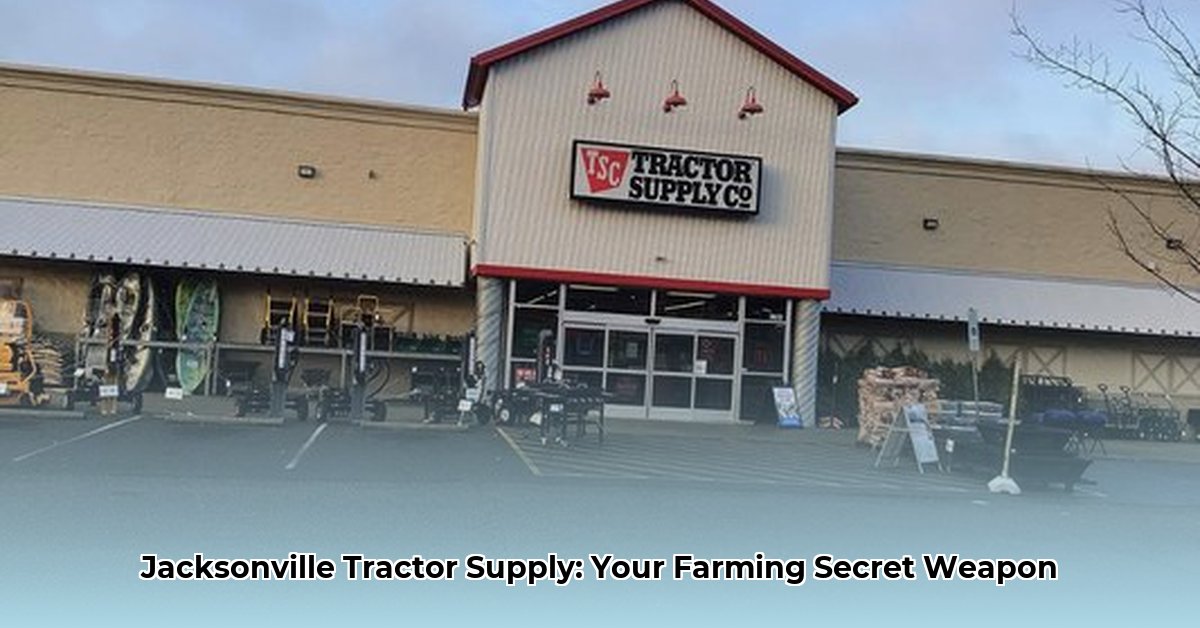
Jacksonville, North Carolina's Tractor Supply Company (TSC) is more than just a retail store; it's a vital resource for the local agricultural community and residents alike. For similar services in nearby Marion, check out this store. This article examines TSC's role in Jacksonville, its impact on the community, and strategies for future growth and success.
TSC's Services and Product Offerings in Jacksonville, NC
The Jacksonville TSC offers a wide range of products and services catering to both agricultural and everyday needs. From animal feed and farm supplies to gardening tools and pet food, the store acts as a one-stop shop for rural and suburban residents. The store’s inventory includes items relevant to sustainable agriculture practices, although a more detailed inventory analysis is needed to assess the full scope of sustainable product offerings. However, the readily available inventory ensures farmers have timely access to crucial supplies, reducing downtime and enhancing productivity. The staff’s deep local knowledge, specifically regarding the region's unique climate and soil types, provides valuable personalized service and advice.
Analysis of TSC's Local Impact
TSC significantly contributes to the Jacksonville community. Local farmers rely on the store for efficient access to essential supplies. This convenience directly impacts productivity and profitability. Moreover, TSC serves the broader community by offering a wide range of products, supporting local employment, and contributing to the local economy. Precise economic impact figures require further investigation, but the store's value is evident in its daily interactions with both farmers and residents.
Actionable Recommendations for Stakeholders
To further enhance TSC's success and impact, specific actions are recommended for various stakeholders:
For Tractor Supply Company:
- Implement Customer Feedback Mechanisms (0-12 months): Conduct regular customer surveys and focus groups to gather feedback on product selection, service quality, and overall satisfaction. (Target: 90% customer satisfaction within 1 year).
- Optimize Inventory Management (0-6 months): Analyze sales data to identify seasonal demand patterns and optimize inventory levels to minimize waste and ensure product availability. (Target: 15% reduction in inventory holding costs within 6 months).
- Enhance Staff Training (Ongoing): Invest in comprehensive staff training programs that emphasize local agricultural best practices and sustainable farming techniques. (Target: 100% of staff certified in sustainable agriculture practices within 2 years).
- Expand Sustainable Product Lines (1-3 years): Introduce a wider selection of environmentally friendly products, such as organic seeds, water-efficient irrigation systems, and sustainably sourced animal feed. (Target: 25% increase in sustainable product sales within 3 years).
- Develop a Customer Loyalty Program (1-2 years): Implement a loyalty program to reward repeat customers and build stronger relationships with the community. (Target: 20% increase in customer retention within 2 years).
For Local Farmers:
- Utilize TSC Resources (Ongoing): Maximize TSC's resources by leveraging both its product selection and staff expertise. Regularly engage with staff to receive guidance on improving farm practices and maximizing yields.
- Provide Feedback (Ongoing): Share feedback and suggestions with TSC staff to aid in their understanding of local agricultural needs and potential product improvements. This active collaboration will streamline the process of acquiring necessary and desirable products.
- Collaborate on Sustainability Initiatives (Long-term): Participate in any educational workshops or sustainable agriculture initiatives TSC may offer or help champion.
For Consumers:
- Support Local Businesses (Ongoing): Support local businesses, like TSC, by making it your preferred source for everyday needs and agricultural supplies.
- Participate in Community Initiatives (Ongoing): Participate in community events or initiatives sponsored by TSC. This actively supports the store and strengthens local relationships.
Competitive Landscape
While detailed competitive data is unavailable, TSC faces competition from other retailers and online vendors. Maintaining a competitive advantage requires a strong focus on exceptional customer service, local expertise, and customized product selection, particularly in the growing segment of sustainable agriculture products. Further research is necessary to fully understand the competitive landscape.
Conclusion
Tractor Supply Company plays a vital role in the Jacksonville, NC community, serving both farmers and residents. By embracing the actionable strategies outlined above, TSC can continue to strengthen its position as a key partner in the area's agricultural and economic growth. Ongoing research into the economic impact and competitive environment will help guide future planning and ensure continued success.
Risk Assessment Summary
Building on the previously noted risk assessment matrix, mitigating risks of supply chain disruptions, changing consumer preferences, and competition requires proactive strategies including diversification of suppliers, continuous market research, and a commitment to exceptional customer service. A robust staff training program will help alleviate possible labor shortages. These proactive measures ensure TSC remains resilient and adaptable in an ever-evolving environment.